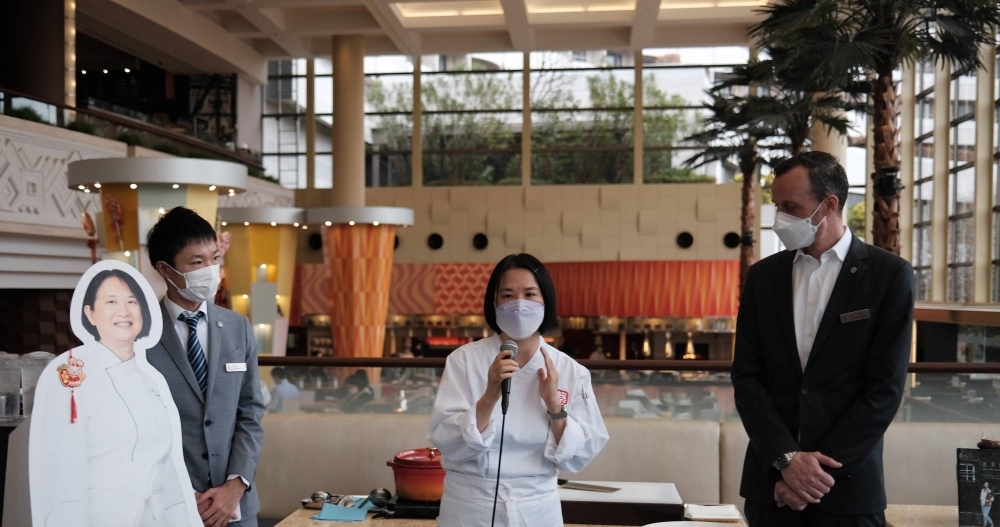Being invited as a guest chef to luxury hotels provides me with an opportunity to showcase my cooking to as many customers in a single day — with the added bonus of learning the best practices of restaurant management.
My first experience as a guest chef was at the Man Ho restaurant in JW Marriott Shenzhen in 2017. Being active on social media has helped me make connections, opening many doors for me. Since then, I have had the privilege to share my food at the Sheraton Grand Hotel Tokyo Bay, the Ritz-Carlton Macau, the W Taipei hotel — and, this year, at The Peninsula Bangkok.
The key as a guest chef is standardization — how to maintain the quality of the food while serving hundreds of diners a day. As a professional chef, I don’t want to compromise on consistency and excellence.
However, Chinese cuisine is difficult to standardize because it depends on a variety of factors. It is not just the selection and combination of ingredients but also cooking skills and methods, such as controlling the heat and temperature, the speed of stir-frying, finding the right balance of seasoning, and more. All of these factors influence the taste, color, aroma and nutrition of the dishes.
To make an authentic Chinese dish, you need to have rich experience and exquisite skills. And as a guest chef, I desire to create the same taste as I do at my small restaurant because they represent my cooking.
In addition to standardization, being a guest chef comes with many challenges, as every hotel and restaurant are managed and staffed differently.
A unique experience for me was working at the Sheraton Grande Tokyo Bay last year. Unlike the other hotels I had worked at before, the Sheraton Grande did not have a Chinese restaurant. The hotel provided me with two Chinese chefs, but they came from northern China and had little knowledge of Cantonese cuisine.

from staff management, financial planning to customer service. | GRACE CHOY
And yet, I was pleasantly surprised by the high quality of standardization the chefs achieved, because at the end of the day, the chefs had solid fundamental skills, were eager to learn and were great team players. As a guest chef, I try to share dishes that are less complicated and require less preparation time so that the team can replicate the same quality of food that I serve at my restaurant.
One of my signature dishes, pan-fried lotus root cake, is a good example. It’s a simple dish that has grilled lotus root topped with seasoned minced pork, coriander and dried shrimp.
Ideally, I would want to pan-fry each piece one by one. But when you’re feeding hundreds of customers at a buffet, that’s simply not possible. To maintain my standards, I would have the staff chefs grill the cakes a little bit and store them in a food warmer, then fully pan-fry them right before refills are requested so that the dish has the crispiness that I want.
Eggplant casserole with salty fish — another favorite dish of mine — also involves relatively few ingredients (minced pork, egg plants and salted fish with seasoning and aromatics). The key to this dish is “flash frying” the eggplants and quick, timely stir-frying.
Along with the cooking, the challenge here is to procure the right kind of salty fish — mayau (threadfin) is the soul of the dish. Luckily, the Sheraton staff were always cooperative as they also wanted to serve authentic Chinese cuisine.
Unfortunately, there are limits to what I can share as a guest chef, as some Cantonese dishes require hours and days of preparation depending on the ingredient. One such ingredient is dry abalone, which you must soak for at least two days. The abalone then needs to be braised in a broth, which includes chicken, chicken feet, pork, Jinhua ham and sugar cane, which helps soften and flavor the dish.
Such dishes, ultimately, can only be prepared and cooked at restaurants for a limited number of people. To fulfill my dream to share my Cantonese food to more people consistently, friends have suggested that I expand my restaurant.
Besides being skilled in the kitchen, a successful restaurateur also needs to master other aspects of the business, from staff management, financial planning to customer service. That's why I continue to strive to improve my management abilities and learn from the best in the industry.
Here, too, being a guest chef has taught me many lessons. The industry practices you can pick up from renowned hotels helped me to see expansion not as a compromise but as a chance to increase customer satisfaction.
On International Women’s Day on March 8, I will cook at the W Hong Kong. With the confidence and management skills I can pick up from these experiences, I will be able to appropriately expand my four-seat restaurant and make my mission to spread Cantonese cuisine a little less impossible.


